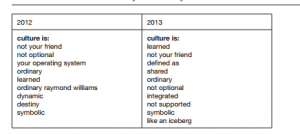Last night I attended a lecture Life and Liberty Communications in the Era of Trump by Dr. Dorthy Kidd. The lecture, as outlined in the poster abstract was broadly about,
” If Trumpism dealt a major blow to political, economic and social justice everywhere, it also set off a new wave of political contestation movements which are working together for nothing less than their lives, livelihoods and lively ways. Responding to Dallas Smythe’s call to analyse the connection between contentious communication and political struggle, this review examines lessons from the communications practices of intersectional struggles in the U.S. over social reproduction, including campaigns regarding immigration, living wages, criminal justice, housing, and natural and information resources.”
Over the last few weeks readings, and discussions, and as is evident in this weeks readings (especially Missed Connections) – media literacy is very important. She also stressed the importance of being tactical. That we need to look for the cracks and find out how to properly utilize them.
At the beginning of her presentation, Dr. Kidd identified the new oligarchy – Facebook, Apple, Amazon, Google – to name a few. And discussed the decline in the quality of news and information being transmitted to the public via the media. What are the dominant channels that citizens are using to acquire their information? (Facebook? Google searches? Twitter? Instagram?) By whom and how is that controlled? And how do we respond? She suggests that you can’t get information from one source anymore but need at least 10 to start to be informed. She suggests a variety of media outlets across sectors. These sectors include: commercial legacy media, partisan media, public service, international state-run, mass infotainment, investigative units, and independent media. Her preferred outlets were identified as the NY Times, BBC, Al Jazeera (for US critiques), Reveal and ProPublica, MotherJones, Alternet and Democracy Now.
Her suggestion for moving forward is to instill media literacy in students and youth. To reclaim these spaces from the identified oligarchy, we must:
- encourage life long media literacy
- challenge knowledge monopolies
- research, write and teach about social justice movements and practices
- design and build appropriate communications infrastructure with community members, and
- train life long media makers
to name a few.
In response to Dr. Kidd’s lecture and a few of our articles, I thought this was an interesting project;
Hogan, Mel & M.E Luka (2014) Polluted and Predictive in 133 Words. The Institute of Network Cultures – Society of the Query Reader. 239-255.
http://networkcultures.org/query/wp-content/uploads/sites/4/2014/06/18.Hogan_Luka.pdf
M.E Luka discusses Google search as an archive. Lists of google suggestions on searches were collected over time using a snipping tool. In the article, the authors state, “…[T]he results will become increasingly telling over time – especially in terms of documenting popular culture in unexpected ways:… I am wondering how these searches might change based on the ongoing queries made to Google…”(250-251). They ask, what is present and what is absent? “Google is not a public archive. But in a sense, if thought of as an archive – the possibilities for creative intervention are endless” (252).
Showcasing a collection of 133 words selected by Mél Hogan, and captured through a series of screen grabs in April 2010, 2011, 2012, and 2013, M.E. Luka leads a dialogue that revolves around the parameters of this ‘polluted’ and predictive archive (Google search) the process and display of the political poetry it generates, and the choice of (the 133) words that constitute the basis of this search.

Leave me a Comment